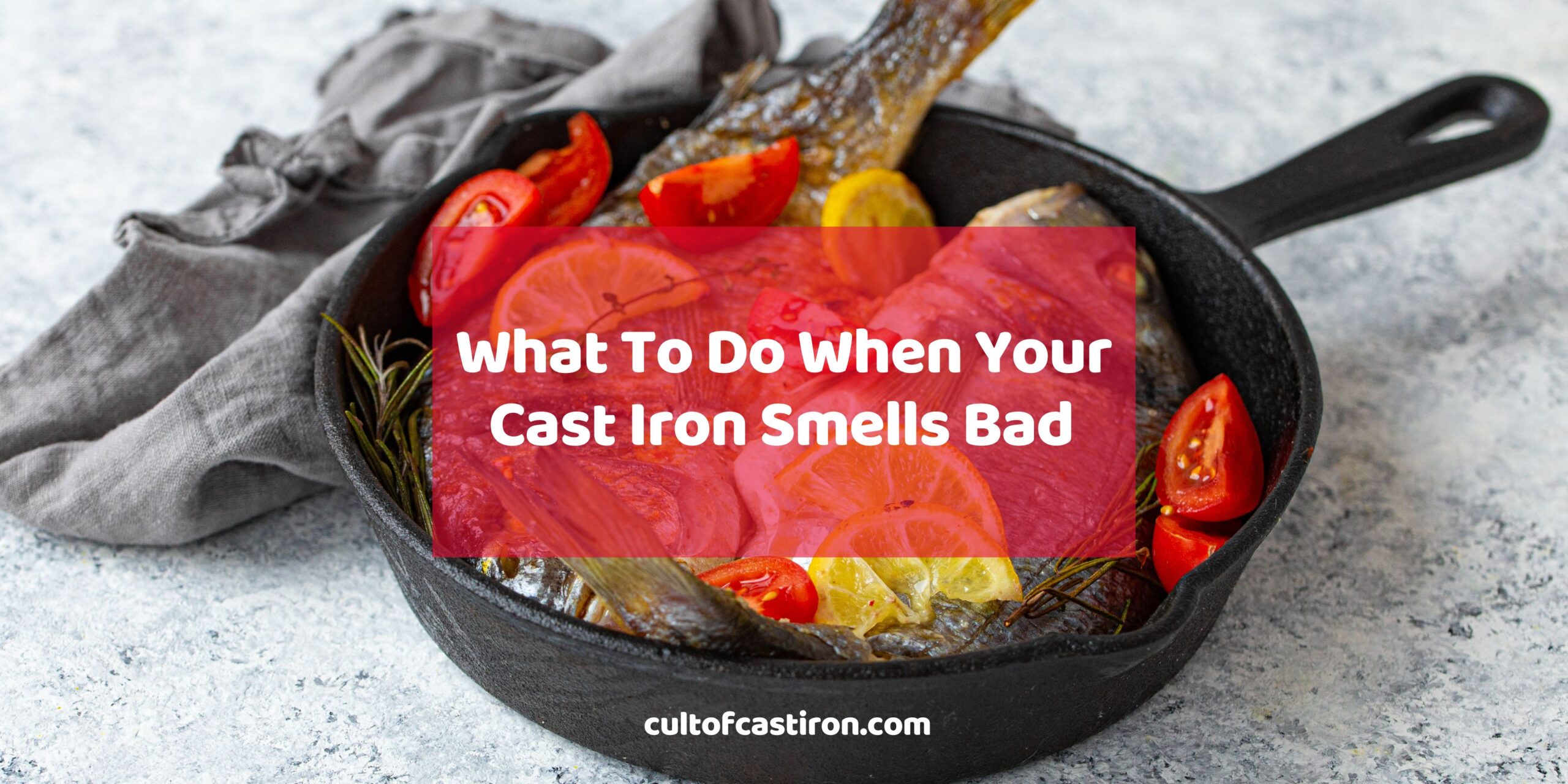Cast iron cookware, with its renowned durability and heat retention, harbors a lesser-known trait – its porous nature. This characteristic makes it susceptible to absorbing a variety of smelly odors that not only assault our olfactory senses, but potentially our sense of taste as well.
In this article, we will delve into the intriguing array of scents that your trusty skillet might produce, exploring their causes and, more importantly, their solutions. We’ll guide you through identifying, understanding, and resolving various odors, ensuring your cast iron remains a beloved and odor-free companion in your culinary adventures.
Different Types of Odors Cast Iron Users Encounter (and How to Remove Them)
In this section, we explore the common types of cast iron odors and provide practical steps to effectively remove them.
Cast iron smells burnt
The burnt smell in cast iron cookware is typically a strong, acrid odor, akin to charred wood or overcooked food. It’s usually quite noticeable and can linger in the pan, and can impart a burnt and bitter taste to subsequent meals.
Often, this odor is the result of food particles left in the pan after cooking, especially high-carbohydrate foods or sugary sauces that can easily burn and stick.
How to remove burnt smell from cast iron
If you burned something on your pan, don’t fret! You can easily restore this burnt cast iron skillet to its former glory in a few minutes.
- Boil water on the pan to loosen any burnt residue.
- Scrub the surface thoroughly with a stiff brush.
- Use soap or a baking soda paste to neutralize the odors on the skillet.
- Rinse, dry, and oil as you would in the usual cast iron cleaning process.
How to avoid getting burnt smell on your cast iron skillet
It should go without saying that NOT letting anything burn on your skillet is the best way to avoid dealing with the burnt smell later on. If you consider yourself a newbie in cast iron cooking, feel free to read our guide specifically for new cast iron owners.
2. Cast iron smells rancid
A rancid odor in cast iron cookware is characterized by a stale, spoiled, or sour smell. This unpleasant aroma is akin to old, spoiled fats or oils and can be quite off-putting, affecting the flavor of foods cooked in the pan.
This odor usually happens when there is a build-up of old oils on infrequently used pans. Once these oils break down and oxidize, they will degrade and develop rancid odors.
How to remove rancid smell from cast iron
It is quite easy to remove the rancid smell from your pan as you only need to get rid of the spoiled oil on the surface. Here’s how to do it:
- Wash with mild detergent to thoroughly rid the pan of the rancid oil.
- Scrub with baking soda paste to neutralize any odors on the pan.
- If the rancid smell persists, repeat the cleaning and seasoning process.
How to avoid oils from going rancid on your cast iron
The best way to avoid oils from going rancid on your cast iron skillet is by regularly using it. Regular use means that you are constantly cleaning old oil and then adding fresh oil to the pan, thus reducing the chance of the entire oil layer becoming rancid. It really is that simple!
3. Cast iron smells like fish
The fish odor in cast iron cookware is typically a persistent, unmistakable scent that can be particularly strong and may linger in the pan, affecting the taste of other dishes cooked in it.
How to remove fishy smell from cast iron
It can be a little tricky to remove the fishy smell on your pan, but don’t let this dissuade you from cooking fish on your cast iron skillet! And as a seafood lover myself, here’s my tried and true method when it comes to removing the fishy odors from my cast iron skillet:
- Wash the cast iron skillet in soapy water. Rinse, then dry.
- Sprinkle baking soda over the pan and leave it for a few hours to absorb the odor.
- After a few hours, scrub the pan with baking soda paste to remove.
- Rinse, dry, and oil as you would in the usual cast iron cleaning process.
How to prevent your cast iron from smelling like fish
There are ways to prevent fishy odors from imparting on your cast iron skillet. Here are some techniques I use to prevent this problem:
- Clean your fish thoroughly before storage.
- Marinade or season your fish before cooking – salt doubles as a deodorizer!
- Remove fish from the pan immediately after cooking so that its aroma won’t latch on to the metal.
- If you can, clean the pan immediately after use as well.
Mind you: I buy most of my fish from a wet market here in the Philippines, and they are not thoroughly processed as those from the grocery store, so the fishy odors from the start are through the roof! However, I don’t experience fishy-smelling skillets much because of the tips I provided above.
4. Cast iron smells like metal
Yes, I know. “Duh!” right? But actually its not as simple as that. At best, cast iron should smell neutral. If the scent of bare metal is too pronounced, then it’s a sign that there is something wrong with the pan, and that it may impart this scent and taste to whatever it is that you are cooking. It’s often more noticeable in new pans or those that have been stripped of their seasoning. Also, I often smell this scent when my pans have surface rust.
How to remove metallic smell from cast iron
If you see any spots of cast iron that is not covered by seasoning, then this is likely the culprit. The best way to solve that is to add a new layer of seasoning on the pan. However, if you suspect that the pan only has surface rust, then do the following steps:
- Remove any surface rust from the pan.
- Wash the pan with mild detergent to deodorize the odor.
- Rinse, dry, and oil as you would in the usual cast iron cleaning process.
How to prevent your cast iron from smelling metallic
Here are some tips that prevent those metallic odors from poking through the cast iron into your food.
- Season your pan properly – and make sure there are no bald spots!
- Wash brand new skillets with soap.
- Cook ingredients that absorb or mask the metallic odor. Think of potatoes, onions, and ginger. This is also how they season carbon steel woks for the first time.
Let Your Food’s Natural Aroma Shine
Understanding the causes behind these smells and knowing how to effectively remove them is key to maintaining the pristine condition and functionality of your cast iron. Remember, the secret to a well-maintained skillet lies in regular use, proper seasoning, and gentle cleaning. Embrace these practices, and your cast iron cookware will not only be odor-free but will also serve as a faithful companion in your culinary adventures for years to come. Happy cooking!
If you want to learn more about cast iron cookware, apart from how to store cast iron cookware, go ahead and explore Cult of Cast Iron for more guides and blog articles! Cult of Cast Iron is your ultimate source of information and inspiration for anything and everything cast iron cookware.
Join the Cult of Cast Iron today and discover the wonders of cast iron cookware!

Miguel is a cast iron enthusiast from Cavite, Philippines. He works in the digital marketing field as a content marketing strategist. On the side, he manages a small online bookstore and tends to his plants.

